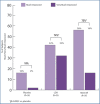Lisdexamfetamine dimesylate: the first prodrug stimulant
- PMID: 20532026
- PMCID: PMC2880945
Lisdexamfetamine dimesylate: the first prodrug stimulant
Abstract
Attention deficit hyperactivity disorder (ADHD) is one of the most common neurobehavioral disorders affecting children. The symptoms often persist into adolescence and adulthood, causing significant impairments. ADHD often remains undiagnosed and untreated, and because of its potential long-term impact, recognition, diagnosis, and management in children have become increasingly important. Education about ADHD and the available therapy options is important for both the patient and the caregiver to achieve more effective treatment. Efficacy and safety data on stimulant medications have provided evidence for their effectiveness in treating ADHD. Although they remain the first-line treatment, the need for multiple daily dosing and concerns about the general risk profile of stimulants have led to the development of new agents, including once-daily formulations that provide prolonged duration of action. However, pharmacokinetic variability of these formulations can result in inconsistent effects in some patients. The use of prodrug technology and the development of the only prodrug stimulant, lisdexamfetamine dimesylate (LDX), provide a promising treatment option for ADHD with an improved overdose potential risk profile when compared to d-amphetamine. This review of LDX, which presents the efficacy, safety, and pharmacokinetic profile of this new class of stimulant, is designed to help the physician better understand the clinical use of this agent in treating ADHD.
Keywords: ADHD; Vyvanse; lisdexamfetamine dimesylate; prodrugs; stimulant medications.
Figures
References
-
- Biederman J, Faraone SV. Attention-deficit hyperactivity disorder. Lancet. 2005;366:237–48. - PubMed
-
- Spencer TJ, Adler LA, McGough JJ, et al. and The Adult ADHD Research Group. Efficacy and safety of dexmethylphenidate extended-release capsules in adults with attention-deficit/hyperactivity disorder. Biol Psychiatry. 2007;61:1380–7. - PubMed
-
- McGough JJ, Barkley RA. Diagnostic controversies in adult attention deficit hyperactivity disorder. Am J Psychiatry. 2004;161:1948–56. - PubMed
-
- Faraone SV, Biederman J, Mick E. The age-dependent decline of attention deficit hyperactivity disorder: A meta-analysis of follow-up studies. Psychol Med. 2006;36:159–65. - PubMed
LinkOut - more resources
Full Text Sources
Other Literature Sources

